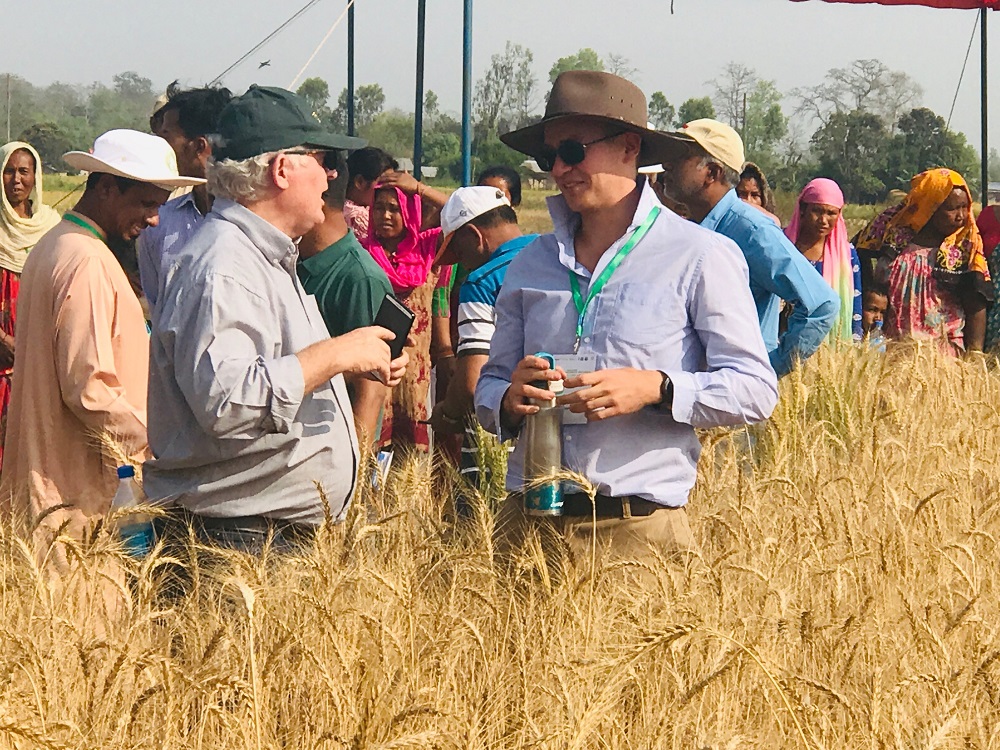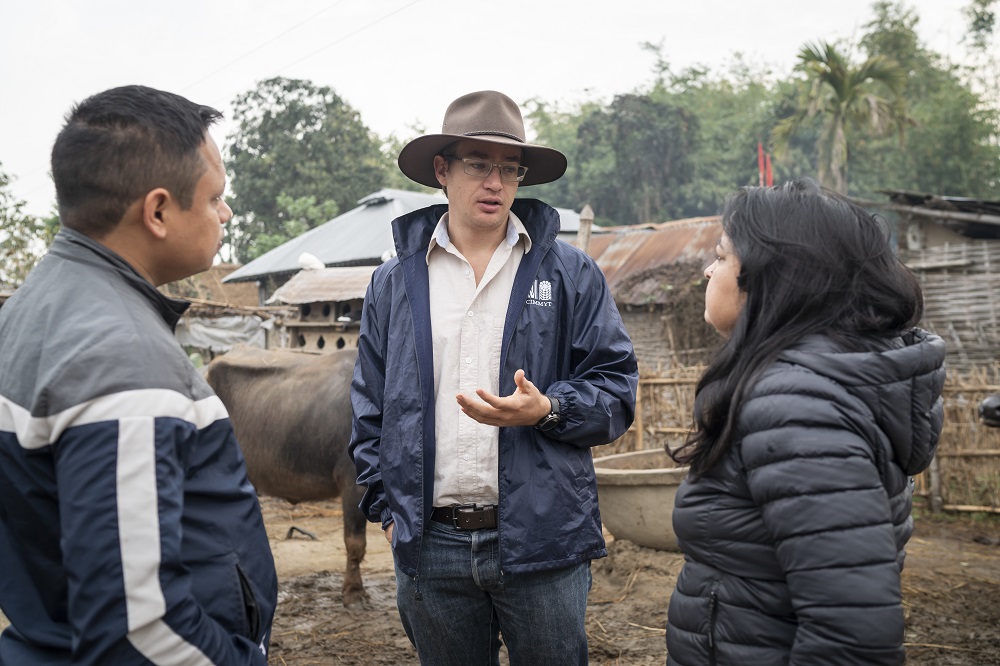Dr Brendan Brown is a research scientist interested in farming systems and the science of decisions.
The thread weaving together his story is a strong sense of social justice and a desire to improve the world.
Sowing seeds for equitable agriculture
Brendan's career journey reflects fond foundations from a childhood on the family hobby farm. It also includes a talent for problem solving, and a passion for seeing the world.
"I grew up between Sydney and the family hobby farm on New South Wales' beautiful south coast. My favourite times were outdoors, preferably barefoot," Brendan said.
When university beckoned, his love of the outdoors influenced his choice. Brendan completed an honours degree in soil science at the University of Sydney.
Like many young graduates, the lure of travel and curiosity took him overseas.
Through a combination of backpacking, volunteering and working for organisations like the Australian Centre for International Agricultural Research (ACIAR) on global agricultural development and the Food and Agriculture Organization (FAO) in Ghana, Brendan gained invaluable insights into farming systems beyond Australia.

Understanding farmer decisions to adopt beneficial approaches
Witnessing the challenges faced by farmers in sub-Saharan Africa ignited Brendan's determination to create positive change.
"Physical sciences progress in leaps and bounds, creating new technologies that can benefit farmers and economies every day," Brendan said.
"But very little is often adopted by those who could benefit the most. I wanted to understand how technological and practice breakthroughs make it to a point of benefiting farmers and economies."
Returning to Australia, Brendan completed a PhD at Adelaide University.
His thesis: The what, how and why of the sustainable intensification of African smallholder agriculture, drilled down into the science of farmer decision making across eastern and southern Africa.
"I wanted to understand why farmers don't adopt climate smart practices that would benefit them."
Consider people
Brendan recognised that when we think of farming we tend to think of plants and soils. But we also need to consider people. This reckoning steered him towards behavioural and decision-making research.
"Farmer make decisions based on their personal contexts, knowledge and intuition," Brendan said.
"My research looked at the complex web of drivers that combine to inform how farmers make decisions. From individual farm contexts to community dynamics and research and extension environments. It's important to unpack why they do things and how the system might be adjusted to help them improve".
Following his doctoral research, Brendan went backpacking again.
While passing through the headquarters of the International Maize and Wheat Improvement Centre (CIMMYT) in Mexico, he gave a lecture on farmer practice change. This led to a job offer working across Nepal, India and Bangladesh, as an agricultural innovation scientist.
He led programs that aimed to help farmers on their journey to more sustainable and resilient farming practices.
"Spending time in different farming contexts teaches you to assess why farmers work in certain ways, Brendan said.
"It gives perspective to understand an individual's decision making."

Impossible without Brendon
Beginning a family brought Brendan back to Australia again and he joined CSIRO as an Impossible without you recruit. Here he continues his work at the intersection of behaviour, ethics and agricultural science.
Brendan now applies his expertise to Australian farming systems and contributes to the Grains Research and Development Corporation (GRDC) National Risk Management Initiative (RiskWi$e).
His work is about more than data. It's about understanding the human side of farming and the complex intricacies of decision making.
Empowering farmers, both smallholder and broadacre, remains crucial for Brendan.
He's passionate about supporting the next generation of agricultural researchers and remains committed to empowering farmers, both smallholder and broadacre, on their journey to more resilient, profitable and sustainable livelihoods.
Brendan's career continues to be a testament to his personal mission to make positive change.
Dr Brendan Brown is a research scientist interested in farming systems and the science of decisions.
The thread weaving together his story is a strong sense of social justice and a desire to improve the world.
Sowing seeds for equitable agriculture
Brendan's career journey reflects fond foundations from a childhood on the family hobby farm. It also includes a talent for problem solving, and a passion for seeing the world.
"I grew up between Sydney and the family hobby farm on New South Wales' beautiful south coast. My favourite times were outdoors, preferably barefoot," Brendan said.
When university beckoned, his love of the outdoors influenced his choice. Brendan completed an honours degree in soil science at the University of Sydney.
Like many young graduates, the lure of travel and curiosity took him overseas.
Through a combination of backpacking, volunteering and working for organisations like the Australian Centre for International Agricultural Research (ACIAR) on global agricultural development and the Food and Agriculture Organization (FAO) in Ghana, Brendan gained invaluable insights into farming systems beyond Australia.
Understanding farmer decisions to adopt beneficial approaches
Witnessing the challenges faced by farmers in sub-Saharan Africa ignited Brendan's determination to create positive change.
"Physical sciences progress in leaps and bounds, creating new technologies that can benefit farmers and economies every day," Brendan said.
"But very little is often adopted by those who could benefit the most. I wanted to understand how technological and practice breakthroughs make it to a point of benefiting farmers and economies."
Returning to Australia, Brendan completed a PhD at Adelaide University.
His thesis: The what, how and why of the sustainable intensification of African smallholder agriculture, drilled down into the science of farmer decision making across eastern and southern Africa.
"I wanted to understand why farmers don't adopt climate smart practices that would benefit them."
Consider people
Brendan recognised that when we think of farming we tend to think of plants and soils. But we also need to consider people. This reckoning steered him towards behavioural and decision-making research.
"Farmer make decisions based on their personal contexts, knowledge and intuition," Brendan said.
"My research looked at the complex web of drivers that combine to inform how farmers make decisions. From individual farm contexts to community dynamics and research and extension environments. It's important to unpack why they do things and how the system might be adjusted to help them improve".
Following his doctoral research, Brendan went backpacking again.
While passing through the headquarters of the International Maize and Wheat Improvement Centre (CIMMYT) in Mexico, he gave a lecture on farmer practice change. This led to a job offer working across Nepal, India and Bangladesh, as an agricultural innovation scientist.
He led programs that aimed to help farmers on their journey to more sustainable and resilient farming practices.
"Spending time in different farming contexts teaches you to assess why farmers work in certain ways, Brendan said.
"It gives perspective to understand an individual's decision making."
Impossible without Brendon
Beginning a family brought Brendan back to Australia again and he joined CSIRO as an Impossible without you recruit. Here he continues his work at the intersection of behaviour, ethics and agricultural science.
Brendan now applies his expertise to Australian farming systems and contributes to the Grains Research and Development Corporation (GRDC) National Risk Management Initiative (RiskWi$e).
His work is about more than data. It's about understanding the human side of farming and the complex intricacies of decision making.
Empowering farmers, both smallholder and broadacre, remains crucial for Brendan.
He's passionate about supporting the next generation of agricultural researchers and remains committed to empowering farmers, both smallholder and broadacre, on their journey to more resilient, profitable and sustainable livelihoods.
Brendan's career continues to be a testament to his personal mission to make positive change.
